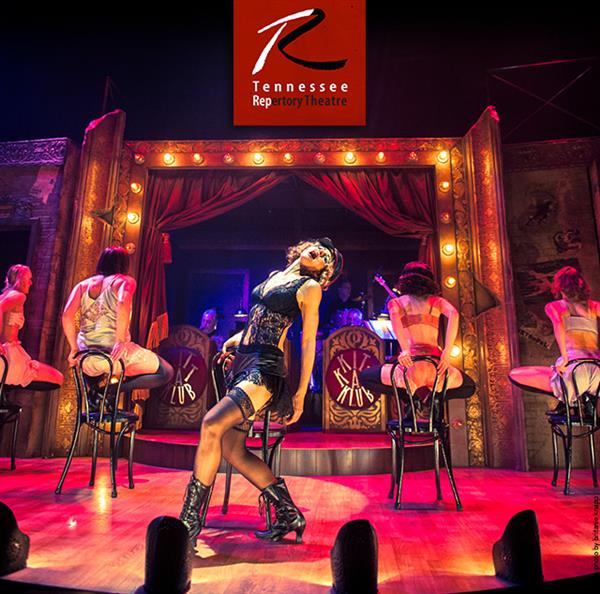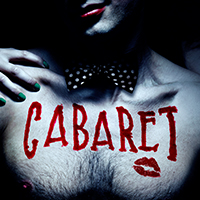Currently showing at TPAC’s Johnson Theater through March 16 is Cabaret, and whether or not you’ve seen the 1972 film musical starring Liza Minnelli, this stage presentation is a unique must for those who like their musicals served spicy hot. Still culturally and politically relevant, this fine production, directed by Rene D. Copeland, proves there is absolutely no need to traipse off to NYC for the finest in theater. No matter your appetite—burlesque, history, or competing narratives—it can be satisfied right here in Music City. And if you hunger for nothing stronger than some delicious singing and outrageously provocative, magical choreography, then all you want is a cabaret . . . and here you go!
A blistering kaleidoscope of love and loss, Cabaret tells the story of the Kit Kat Klub, a seamy oasis in the midst of mind-numbing political squalor. The musical manages to deftly blend the tension between a host of characters who are all teetering on the precipice of World War II. Set in a 1920s Berlin cabaret, ladies and lads of the night cater to the pleasures of all comers, absorbing the bruises and blows of a burlesque-craving Weimar, Germany. The non-German characters of British Sally Bowles (played by the delightful Jenny Littleton of “Doyle and Debbie” fame), a good-time working English girl a long long way from home, and her closeted American writer friend Cliff Bradshaw (portrayed by Patrick Waller) reverse national identities in this stage version. Cabaret, as a cultural and political metaphor for its time, is given a different treatment in this adaptation by switching the political identities of the main characters. Allowing Sally to be British and openly apolitical here lends her a quality more mature than that the endearing American charmer portrayed by Minnelli back in 1972. Cliff Bradshaw, played by the leonine Michael York in the film, was a closeted gay British man (or was he?). Here, Cliff is an exceedingly naive American with a heart of gold. Revisionist history and the competing narrative allow the audience to appreciate the evolving sexual and political identities. But if that kind of analysis leaves you cold, the cabaret with its Willkommening entertainers will warm you right up. They aim to please. These über-flexible specimens and survivors of life have one message. On with the cabaret!
The play has interesting American and British roots in any case. British playwright John Van Druten’s 1951 play I Am a Camera, together with fellow Brit Christopher Isherwood’s short-story collection, Goodbye to Berlin (1939), formed the basis of Joe Masteroff’s book for the Kander and Ebb musical Cabaret (1966). This contemporary stage version has undergone many transmutations that aren’t commonly seen in theater. This is partly due to the evolution of sexuality’s opening closet. The Kit Kat Klub doesn’t need to camouflage its unbridled sexual behavior, drugs, alcohol, etc. Indeed, that lays the dirty bare floor necessary for a full-on exploration of sexual politics. A free for all!
Herr Schultz and Fraulein Schneider, played flawlessly by Derek Whittaker and Ruth Cordell, are the ill-fated lovers representing old, comfortable Jewish Germany and old, pragmatic Aryan Germany. Here they are, star-crossed lovers who can barely admit or be permitted to reveal a single indiscretion (Oh, who might see?) Cordell’s numbers “So What?” and “What Would You Do?” are heartbreakingly perfect, and when the two finally come together and decide to embrace true love in their older, wiser stages of life, the number “It Couldn’t Please Me More” sums it up. While Sally and Cliff become intimate, albeit for different motivations, their mistakes can be forgiven as youth’s follies. For the older pair, we grieve. Such promise, such entwining self-acceptance, expressed in “Married” and the cast’s gorgeous Act I closer, “Tomorrow Belongs to Me.”
Coming in at an hour and forty-five minutes in the first act of a two-act play, attention was strained, and that’s not fair to an exquisite cast and story. Either cut something out or break it up earlier.
Act II opens up in refreshing mode, where it is discovered that the match made in heaven between the German and the Jew cannot ultimately hold back the jaded tide of oppression that will soon sweep over Europe. Practicality trumps in love as well as in politics. There is no bitterness between the German and German Jew, only a sort of gracious nod. “We’ve been here before . . . this too shall pass,” they seem to whisper. But all’s well—look at the cabaret! Such youth, such joie de vivre!
Sordid and decadent, delicious in its licentious wasteland, Cabaret is glued together by its pacemaker, the Emcee (played by the brilliant David Compton), the perfectly obliging canvas. He’s only to happy to bear the inevitable weight of buoyant, flirty fearlessness . . . pick your colors, choose your angle, he’s happy to comply. As a bisexual Jewish character (in this version!), he flawlessly sets the pace and mood between ecstatic and heartfelt numbers . . . he knows the score, he’s been there before, and he embodies the spirit of Cabaret to the hilt. Play now, for tomorrow we die. Anyway you slice it, it’s a cabaret! What makes this musical most compelling is its fearlessness. Despite one of the most inexplicably disturbing stories humanity has endured, the “cabaret” allows us to keep on keepin’ on. Just make sure the orchestra is lively and the boys and girls indefatigable! We can dance all night!
Cabaret continues through March 16. Click here for tickets and more information















